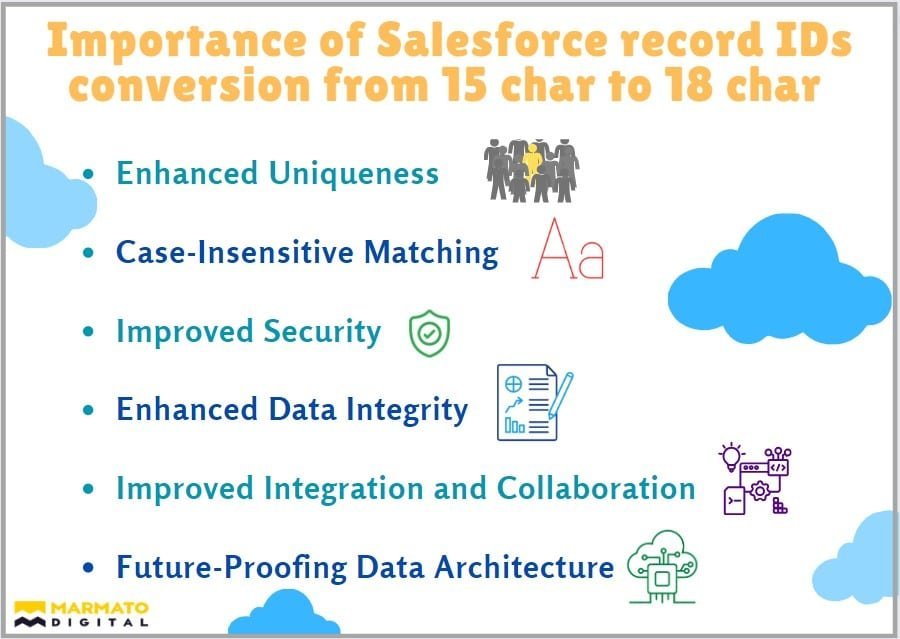In the world of Salesforce, Record IDs serve as unique identifiers for different records within the platform. Initially, these IDs were 15 characters long, but now Salesforce 15 to 18 characters record IDs shift occurs. And it is essential to understand why this conversion is necessary for businesses utilizing Salesforce. In this article, we will explore the reasons behind the need for Salesforce 15 to 18 characters record IDs conversion, shedding light on its benefits and importance for organizations relying on the platform. By clearly understanding this transition, businesses can better navigate the changes and make informed decisions to optimize their Salesforce experience.

Why Salesforce made the change 15 to 18 characters record IDs?
Salesforce made the decision to convert 15 digit to 18 digit record IDs to address a limitation in their system. The 15 character record IDs posed difficulties when integrating Salesforce with external systems or working with data that required case-insensitive matching. In some instances, records with similar names but different case sensitivity could cause conflicts or inaccurate data associations.
To overcome these challenges and ensure better compatibility and data integrity, Salesforce transitioned to an 18 character record ID format. And the new format includes a mix of letters and numbers, providing a larger namespace and supporting case-insensitive matching. Additionally, this change allows for improved integration capabilities and reduces the potential for data inconsistencies caused by case sensitivity.
Importance of Salesforce 15 to 18 characters record IDs conversion:
The adoption of 18 character record IDs in Salesforce is essential for enhancing uniqueness and security within the system. Here’s why it’s important to convert 15 digit to 18 digit record IDs:

• Enhanced Uniqueness:
The 18 character record IDs provide a significantly larger name space compared to the 15 character format. This expanded namespace reduces the chances of duplicate IDs, ensuring that each record in Salesforce has a unique identifier. Further, it becomes easier to accurately identify and manage individual records, preventing any confusion or conflicts arising from duplicate IDs.
• Case-Insensitive Matching:
Salesforce 18 char ID format supports case-insensitive matching, which means that the capital letters in record IDs no longer impact their recognition. Previously, the 15 char IDs were case-sensitive, which could lead to issues when integrating Salesforce with other systems or performing searches and comparisons. But the transition to 18 characters eliminates this problem and allows seamless integration and data management across different platforms.
• Improved Security:
The 18 character record IDs in Salesforce are a combination of letters and numbers, making them harder to predict or manipulate. This increased complexity adds an extra layer of security to the system, reducing the risk of unauthorized access to records. By adopting longer and more randomized IDs, Salesforce enhances the overall security posture of its platform.
• Enhanced System Scalability and Data Integrity:
The transition to 18 character Record IDs in Salesforce helps to enhance the platform’s scalability. The longer IDs exponentially increase the accommodation for the potential number of unique records, allowing businesses to efficiently manage to expand data volumes without compromising system performance. Additionally, this conversion enhances data integrity by reducing the likelihood of ID collisions or duplication, ensuring accurate record identification, and eliminating potential data conflicts.
• Improved Integration and Collaboration:
By converting to 18 character Record IDs, businesses can improve integration and collaboration with external systems and applications. Many external systems and APIs have already adapted to support the longer IDs, enabling seamless data exchange and synchronization. This compatibility ensures smooth interaction between Salesforce and other platforms, reducing integration complexities and potential disruptions. Further, organizations can leverage this to streamline processes, enhance cross-platform workflows, and encourage collaboration with partners and stakeholders.
• Future-Proofing Data Architecture:
In Salesforce, it is a proactive step toward future-proofing data architecture. As businesses grow and accumulate more records, longer IDs provide flexibility and scalability for handling increased data volumes. By embracing this change, organizations can ensure that their data architecture remains robust and capable of accommodating future expansion, avoiding limitations that may arise with the 15-character IDs.
To conclude, Salesforce’s decision to convert 15 digit to 18 digit record IDs ensures that it uniquely identifies each record in its system. And it also simplifies integration processes through case-insensitive matching and improves the security of its data. These enhancements contribute to a reliable data management environment, benefiting Salesforce users in maintaining data integrity and protecting sensitive information. Finally, to sum up, organizations must stay informed and adapt to the transition, making the most out of the enhanced capabilities of the Salesforce 15 to 18 character Record ID conversion.
Unlock the Power: Convert Salesforce Record IDs to 18 Characters!
Leap and understand the importance of converting Salesforce Record IDs from 15 to 18 characters. Discover the benefits and implications for your organization. Start optimizing your Salesforce experience today!
With our expertise and experience in the Salesforce platform, we can help you with various aspects, such as system implementation, customization, integration with other systems, and data migration. Contact Us to get started and achieve successful outcomes.
Subscribe to blogs
Get our latest blogs directly to your inbox.

